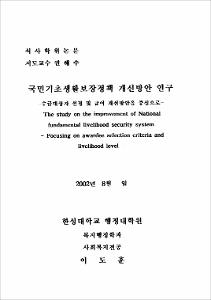국민 기초 생활보장 정책 개선방안 연구
= (The) study on the improvement of national fundamental livelihood security system : focusing on awardee selection criteria and livelihood level
- Type
- Thesis
- Alternative Title
- 수급대상자 선정 및 급여 개선방안을 중심으로
- Department
- 복지행정학과사회복지전공
- Issued Date
- 2002
- Publisher
- 한성대학교 행정대학원
- Keyword
- 국민기초생활보장제도; 수급자 선정기준; 최저생계비 지원
- Files in This Item:
-
-
Download
 000000066179.pdf
기타 데이터 / 3.77 MB / Adobe PDF
000000066179.pdf
기타 데이터 / 3.77 MB / Adobe PDF
-
Items in Repository are protected by copyright, with all rights reserved, unless otherwise indicated.